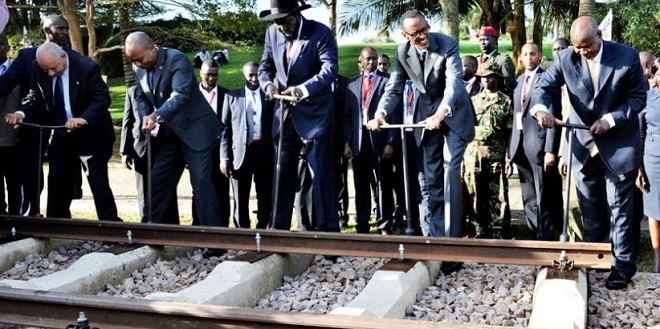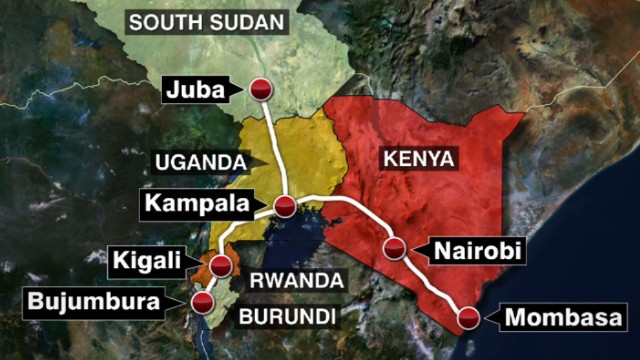
Kampala, Uganda | THE INDEPENDENT | The Ugandan government rejected a China Exim Bank proposal to use revenue from Oil to pay for a loan to build the planned Standard Gauge Railway (SGR). This is according to information shared by Works and Transport Minister Gen Edward Katumba Wamala in a meeting with the Physical Infrastructure Committee of Parliament on Wednesday.
The railway venture is part of the Northern Corridor Integration Projects that begins from Mombasa, through Nairobi, to Kampala, Kigali and Juba. The multi-billion-dollar railway line conceived under the East African Community (EAC) was agreed upon in 2011 by the presidents of Uganda, Kenya, Rwanda and South Sudan.
The plan was to have the railway run from Mombasa port to Kigali via Kampala with a connecting line to Juba. The 1,740km (1,081 miles) of the entire SGR project is expected to cost USD 12.8 billion while the Ugandan leg of 273 kilometres was expected to cost USD 2.3 billion, which initially was to be funded with a loan from Exim Bank.
In the initial stages, the government of Uganda engaged China Harbour Engineering Company Limited (CHEC) to develop the Eastern route covering 261km from Tororo to Kampala through, Iganga and Jinja as well as the Northern routes covering 476km from Tororo through Gulu to Nimule, with a spur covering 117km to Pakwach.
But while Kenya made significant progress on the project, the Ugandan side stalled due to lack of funding.
It is on the basis of this delay that Morris Kibalya, the Bugabula South MP wondered when the project would take off. Kibalya said that ever since he joined parliament in 2016, the government was talking about SGR, yet there is nothing on the ground to date.

In response, General Katumba said that negotiations were ongoing but the government was trading carefully because it detected danger in the proposal by the potential funder.
“The financiers, EXIM Bank of China was concerned about the payment of the loan. We told them that the government will be the one to pay the loan, you do not decide where the payment of the loan will come from,” Katumba told the MPs, adding that the Bank cannot look into Uganda’s resources and be the one to suggest or decide where the loan repayment money will come from.
Katumba also told the committee that following the Presidential the directive, the project costs were since revised downwards from USD 2.3 billion to USD 2.18 billion.
Similarly, the acting Commissioner for Policy and Planning at the Ministry of Works, Peter Kabanda said that Government was still negotiating the funding for the project. Katumba however added that the Ugandan project is still on course and considered a top priority for the government.
“Government will continue to source for financing from the financiers. The Ministry of Finance made a loan re-application to the Bank in October 2019 after the Ministry of Works reviewed the project bankable feasibility study and undertook a comprehensive fiscal analysis of the project,” his statement read.
Kabanda says that after the re-application, the Bank only responded in January 2020 and requested clarification on uncertainty about the connection between Uganda and Kenya that is likely to affect economic feasibility. It further indicated that there was a need for an operations plan of the project to ascertain the cash flow and sustainability of operations. Kabanda says that the government submitted the response through the Chinese Embassy in Uganda.
Uganda is expected to get its first oil in 2025. With the official estimate of 1.7 billion Barrels in the 20 per cent explored area, Uganda can get at least USD 85 billion, according to the projections.
*******
URN
 The Independent Uganda: You get the Truth we Pay the Price
The Independent Uganda: You get the Truth we Pay the Price


